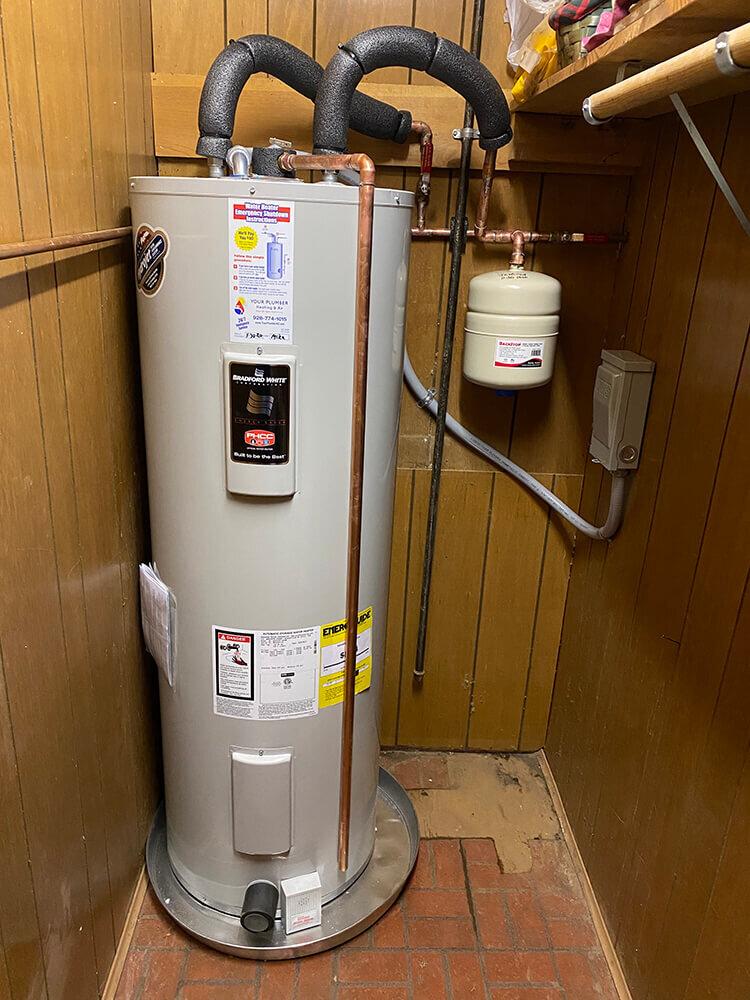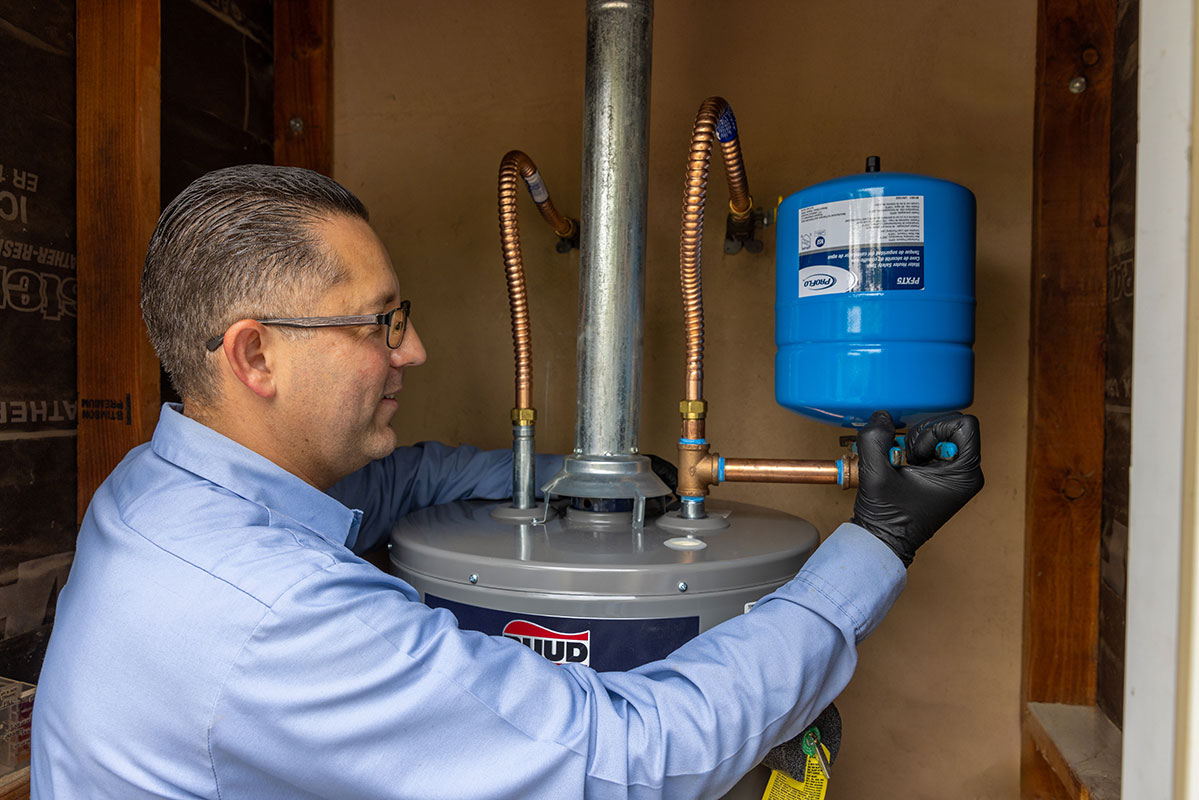Affordable Drain Cleaning Services to Remove Blockages and Unpleasant Smells
Affordable Drain Cleaning Services to Remove Blockages and Unpleasant Smells
Blog Article
Complete Overview to Water Heating SystemInstallation and Substitute
Recognizing the ins and outs of water heater installation and replacement is essential for property owners looking for to make certain performance and integrity in their warm water supply. From choosing the proper kind and dimension to carrying out a seamless setup process, a number of aspects need to be thought about to prevent common mistakes.
Types of Water Heating Units
When taking into consideration hot water heater setup and replacement, it is crucial to recognize the different kinds of hot water heater available on the market. The most usual types include container water heating units, tankless water heating systems, heatpump water heating units, and solar water heaters.
Container water heating units are standard systems that store a specific quantity of warm water, making them easily offered when required. They are typically much less costly in advance however might incur higher energy costs in time as a result of warm loss. In comparison, tankless water heating units provide warm water as needed, eliminating the requirement for storage space. They are power efficient and can save room, yet their first costs are normally greater.
Warmth pump water heating units utilize electrical energy to move warmth from the air or ground to heat water, using significant energy financial savings however needing even more room and certain installation conditions. Solar water heaters harness solar energy to warm water, giving an eco-friendly option with potential long-term cost financial savings, although they often require a backup system for over cast days.
Recognizing these alternatives makes certain notified decisions concerning installation and substitute, satisfying details requirements and choices.
Picking the Right Size
Picking the proper size for a hot water heater is important to make certain ideal performance and performance. An unit that is too tiny will certainly battle to meet home needs, causing inconsistent warm water accessibility and increased power intake. On the other hand, an oversized water heating system can lead to unnecessary energy waste and higher utility bills.
To identify the right size, consider the house's top warm water usage. This can be computed based upon the number of owners and their common warm water needs. A household of 4 may need a water heating unit with an ability of 50 to 80 gallons, depending on the usage patterns, such as simultaneous showers and washing.
Additionally, analyze the healing price, which gauges how promptly a heater can renew warm water after it has been made use of. For tankless designs, emphasis on the circulation price, gauged in gallons per minute (GPM), to ensure it satisfies the home's synchronised need.

Installation Refine Introduction

Next, the old device has to be detached and removed, taking treatment to comply with local codes and guidelines regarding disposal. As soon as the old system is out, the new water heating system can be positioned in location. This step entails linking the water supply lines, making certain that all fittings are safe and secure and leak-free.
After establishing water links, it's necessary to link the power supply, whether electrical or gas, following the supplier's directions meticulously. When all links are made, the system ought to be loaded with water, and the power can be turned back on. Lastly, it is necessary to look for leaks and make sure the water heater is working appropriately prior to finishing the installation process.
Typical Installment Errors

One more frequent error is overlooking to adhere to regional codes and laws. Stopping working to follow these standards can not just result in safety and security risks yet might likewise cause costly penalties or the need for expensive reinstallation. In addition, improper venting is a crucial problem. Inadequate ventilation can trigger dangerous gas buildup, presenting severe health threats.
Inaccurate plumbing links are also a prevalent error. Failing to safeguard connections or using the incorrect kind of fittings can bring about leaks and water damages. Neglecting the relevance of a proper drain pan can result in considerable water damages if leakages do occur. Poor insulation of pipes can lead to warmth loss, lowering performance. By avoiding these usual installation important source blunders, house owners can ensure their water heater runs securely and successfully, maximizing performance and long life.
Maintenance Tips for Long Life
Proper upkeep of a hot water heater is crucial for its durability and optimal efficiency. Regular inspections and servicing can stop expensive fixings and prolong the appliance's life expectancy. Begin by checking the temperature level setting; it needs to normally be set between 120 ° F and 140 ° F for optimum energy performance and security.
Every six months, flush the container to remove debris build-up, which can hinder heating effectiveness and create rust. To do this, turn off the heating unit, attach a hose to the drain shutoff, and allow the water run until it is clear.
When they are worn away,Anode rods ought to be evaluated annually and replaced. These poles help avoid container deterioration by attracting destructive aspects in the water.
Additionally, check the stress relief shutoff on a regular basis to ensure it is operating correctly. This valve is important for protecting against excessive pressure accumulation within the container.
Lastly, think about arranging an expert upkeep check every few years for thorough assessments and servicing. By adhering to these upkeep tips, homeowners can considerably improve the effectiveness, safety and security, and life-span of their hot water heater, making certain reliable warm water for several years to find.
Verdict
To conclude, appropriate installation and maintenance of hot water heater are crucial for guaranteeing effectiveness and longevity (drain cleaning). Choosing the suitable type and size, adhering to installment standards, and preventing common blunders substantially add to ideal performance. Normal upkeep checks and professional maintenance assistance sustain capability and protect against expensive repair work. By recognizing these crucial elements, house owners can accomplish a trustworthy warm water supply while reducing possible problems connected to water heating unit operation.
Recognizing the intricacies of water heating system installation and replacement is critical for property owners looking for to ensure performance and dependability in their warm water supply.Tank water heating units are typical systems that store a certain quantity of warm water, making them easily offered when required. In contrast, tankless water heating linked here units offer hot water on need, removing the need for storage. Choosing a water heating system that is either too small or too big can lead to ineffectiveness, resulting in insufficient warm water supply or too much power intake.
By recognizing these necessary facets, homeowners can achieve a trusted hot water supply while decreasing potential issues related to water heater operation. plumber Denton.
Report this page